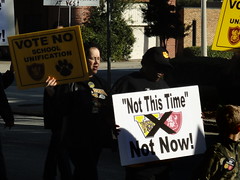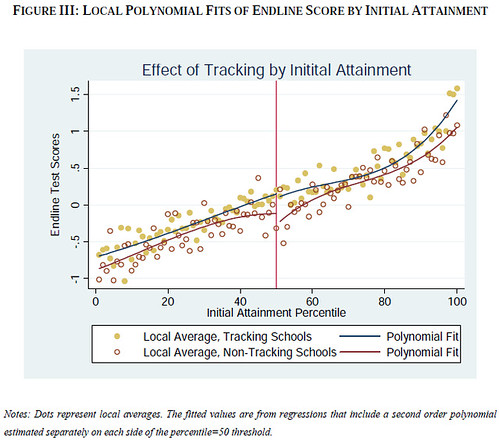Hip! Hip! Hooray!
Absolutely amazing! The grass roots effort, outspent by a 10 to 1 margin, defeat the CUEE effort by 4 to 1! That’s what it’s all about! This is what democracy looks like!
Thanks to all the put in the time and effort and showed up at the polls. Now I hope we can have a serious discussion about the education of our children in Valdosta. Y’all in the county can, too.
-Jim Parker
Tag Archives: FVCS
School Consolidation Lost by a Landslide with 14 of 16 precincts reporting
 79.07% No Consolidation with 14 out of 16 precincts. All that is outstanding is provisional ballots and military, which are usually a handful. The percentage of no votes kept going up. Also more people voted on the school consolidation referendum than there were validated signatures on CUEE’s petition.
79.07% No Consolidation with 14 out of 16 precincts. All that is outstanding is provisional ballots and military, which are usually a handful. The percentage of no votes kept going up. Also more people voted on the school consolidation referendum than there were validated signatures on CUEE’s petition.
It looked like a landslide, and it was:
In other news, the mayoral vote almost voted that of four years ago. John W. Gayle will be the new Mayor of Valdosta with 57.3%.
Ben H. Norton retains his Valdosta City Council Seat with 76.56%.
Sunday sales of alcohol in Valdosta won with 52.3%. A similar alcohol referendum won in Lake Park with 65.99%.
It looks like Ben Futch will be the new Mayor of Lake Park with 54.85%.
Sandy Sherrill, Russell H. Lane, Paul Mulkey, and Roanald Carter will apparently be on the Lake Park City Council.
In Dasher, Edwin R. Smith will be City Council P3 and Donald J. Bryan will be P2.
In Hahira, Ralph Clendenin retains his City Council seat.
The school referendum details: Continue reading
And I feel like there’s somebody meddling in their affairs; I wish they wouldn’t have. —Ashley Paulk @ LCC 7 November 2011
 As
previously noted,
Chairman Ashley Paulk last night told Matt Portwood
he didn’t think the Lowndes
County Commission should be meddling in school affairs.
Here’s the part the VDT didn’t quote:
As
previously noted,
Chairman Ashley Paulk last night told Matt Portwood
he didn’t think the Lowndes
County Commission should be meddling in school affairs.
Here’s the part the VDT didn’t quote:
And I feel like there’s somebody meddling in their affairs; I wish they wouldn’t have.That’s pretty interesting considering that Brittany D. McClure reported for the VDT 4 November 2011 that FVCS makes campaign contributions public:
Ashley Paulk, Lowndes County Commission chairman contributed $200So it’s not like the public doesn’t already know Ashley Paulk’s opinion on this subject, and it seems he was reminding us of it: he contributed money to FVCS, a group actively lobbying to prevent the school consolidation promoted by CUEE.
Chairman Paulk also noted:
We do have county residents who live in the city.Seems like he’s confusing two excuses for the Commissioners not speaking about school consolidation: Continue reading
CUEE Campaign Disclosure Report Completed
From: Sam Allen
Date: November 6, 2011 5:26:15 PM EST
Subject: CUEE Campaign Disclosure Report CompletedFriends,
Attached is a copy of the CUEE Disclosure Report.How many children could this have help!!!!! How many teachers and support staff could we have saved? Are we in still in a recession?
Thanks,
Sam Allen
—
Samuel Allen, Superintendent Emeritus
Tracking can help all distributions of students —new research
Esther Duflo, Pascaline Dupas, and Michael Kremer wrote for American Economic Review, 101(5): 1739–74, DOI:10.1257/aer.101.5.1739,
Peer Effects, Teacher Incentives, and the Impact of Tracking: Evidence from a Randomized Evaluation in Kenya
To the extent that students benefit from high-achieving peers, tracking will help strong students and hurt weak ones. However, all students may benefit if tracking allows teachers to better tailor their instruction level. Lower-achieving pupils are particularly likely to benefit from tracking when teachers have incentives to teach to the top of the distribution. We propose a simple model nesting these effects and test its implications in a randomized tracking experiment conducted with 121 primary schools in Kenya. While the direct effect of high-achieving peers is positive, tracking benefited lower-achieving pupils indirectly by allowing teachers to teach to their level. (JEL I21, J45, O15)The first sentence is the standard “diversity” argument that CUEE keeps making. The authors state it so as to poing out that their study finds that it’s far from the whole story.
I find this part especially interesting: Continue reading
Schools serving children in poverty well —Karen Noll
From: Karen Noll
To: chamber@valdostachamber.com
Cc: [many other people]
Dear Mr. Gooding and Chamber of Commerce,In response to your most recent correspondence, I dare say many ask why the Chamber has such a single focus on an unproven plan with little or no supporting data. Yet again your answers to the many questions about the reasons that the Chamber is acting in this manner are insufficient and demonstrate quite clearly that you are steadfastly working to undermine the very community you claim to support.
Maybe it is my academic background, but I will use data to support my assertions and hopefully rectify some of the misinformation that has been so disruptive to this community, a discussion of a very important issue: the education of our children.
According to the Chamber’s own study, education ranked
12th out of 16 factors in importance to businesses coming to our community. The Chamber’s own survey revealed that a low crime rate and the business friendliness of the local agencies were most important to businesses in 2009.Our community sadly hosts a large population of children living in poverty, and education is the best avenue to future success. For this reason, I am very pleased to report that our economically disadvantaged students in Valdosta City Schools met or exceeded the expected CRCT scores for the district last year. This is no small feat and we have some very dedicated educators to thank for this achievement.
Furthermore, research shows that “larger district size has been shown to be negatively associated with the achievement of impoverished students” ( Howley, C. 1996). This means that the fantastic achievements of our most disadvantaged students will be reversed in a larger district and all of the hard work of VCS educators will be lost in order to create, as you claim, “one great public school system”.
Two years ago the city school district asked Chamber members to provide input on their Strategic Improvement Plan through an online survey. Only 5.2% of responses came from Chamber members. Valdosta City Schools encouraged input from all stakeholders, yet these Chamber members in large part did not respond. Now the Chamber claims to have THE solution for the schools they had no time for when asked for feedback.
Research consistently shows that bigger does not mean better in education. So, ‘combining our resources’ does not bring more money, better educational outcomes, or cost savings. According to the Lowndes County Board of Education consolidation would put a number of teachers out of work. That would mean fewer customers in local businesses and less tax revenue. In other words, school consolidation would negatively impact our local economy and its businesses.
The Chamber is acting irresponsibly toward this community and the children served by the Valdosta City Schools. I am again appalled by the callousness of this organization, the petty name calling and repeated misinformation. It is crystal clear that CUEE and the Chamber are not interested in what is best for our children.
As a positive and strong community we will rise above the bad apple that misbehaves and move forward because it is the right thing to do, and we will continue to model appropriate behavior to our children. At the same time, we as a community must remember the lesson we have learned today: ‘greed can blind’. We are called to reach out to and to help those in need. We will continue to work together as a community and work toward the brightest future for our children.
Thank you, Mr. Gooding, for reminding us again of the path we are called to take.
Vote No for our children!!
My best wishes to you,
Karen Noll
Financial Issues of Consolidation @ LCBOE 1 November 2011
 Video of the open forum Tuesday night at Lowndes High School
where the Lowndes County Board of Education thoroughly addressed
new evidence found by both them and CUEE.
Partly through the information they presented at
their previous forum of 4 October,
they provoked dialog with CUEE in the form of several email
messages from consolidation proponents distributed by the Chamber of Commerce.
At Tuesday’s forum the Lowndes board and staff took CUEE’s messages
as questions, looked up the answers (for example, how much did
taxes rise in places where there was school consolidation recently?)
and worked the result into their own computations.
The general answer is still that consolidation wouldn’t improve
education and would raise property taxes to near the state-mandated
cap, yet that wouldn’t be enough to preserve all the existing
school programs, and teachers and staff would also have to be
let go.
Video of the open forum Tuesday night at Lowndes High School
where the Lowndes County Board of Education thoroughly addressed
new evidence found by both them and CUEE.
Partly through the information they presented at
their previous forum of 4 October,
they provoked dialog with CUEE in the form of several email
messages from consolidation proponents distributed by the Chamber of Commerce.
At Tuesday’s forum the Lowndes board and staff took CUEE’s messages
as questions, looked up the answers (for example, how much did
taxes rise in places where there was school consolidation recently?)
and worked the result into their own computations.
The general answer is still that consolidation wouldn’t improve
education and would raise property taxes to near the state-mandated
cap, yet that wouldn’t be enough to preserve all the existing
school programs, and teachers and staff would also have to be
let go.
So the Lowndes Board and the Valdosta board (several VBOE members plus Supt. Cason were present, and one repeated point was that the two school boards and staff talk to each other all the time) used CUEE’s questions to improve the case against consolidation while promoting community dialog. They even managed to criticize specific named individuals for specific messages Continue reading
All about school consolidation
Apparently there are still many people out there who don’t know much about school consolidation. A quick yet comprehensive way to find out is to read the Grassroots Handbook Against School Consolidation by David Mullis.
See also the statements against consolidation by
both school boards.
Many citizens spoke at the
29 August 2011 VBOE meeting
where all but one Valdosta School Board member
voted for the statement against consolidation.
VBOE then held three open forums:
Continue reading
Which side are they on? The deleted CUEE Referendum Supporters
Referendum SupportersMrs. Julia AriallJohn and Helen Bennett Mr. James Bridges The Honorable Tim [Golden? Carroll?] Mr. Kevin Conrad Mr. & Mrs. Joe Cordova Mr. Ed Crane Mr. Curtis Fowler Mr. Jeff Hanson Mr. Lee Henderson Mr. Ryan Holmes Mr. Jerry Jennett Mr. Joe Johnson Greg and Nancy Justice Mr. Matthew Lawrence Mr. Richard Lee Mr. James McGahee Mr. Dutton Miller Mr. John Peeples Mrs. Jennifer Powell Mr. Donald (Butch) Williams |
- Were they put there without their permission?
- Or did they change their minds?
Time to stand up and be counted. There are two sides to this issue. There’s the truth, and there’s a lie.
Which side are you on?
They say they have to guard us to educate their child.And what about the Chamber board, which apparently is no longer unanimous?
Their children live in luxury, our children almost wild.
Which side are you on, which side are you on?
— Florence Reese
How about Chamber members? Those signs out front of the Chamber: do they represent you?
Which side are you on?
-jsq
The local “unification” attack on public schools is part of a nationwide assault
Jeff Bryant wrote for Campaign for America’s Future 13 October 2011, Starving America’s Public Schools: How Budget Cuts and Policy Mandates Are Hurting Our Nation’s Students
Critics of America’s public schools always seem to start from the premise that the pre-kindergarten-through-12th-grade public education system in this country is failing or in crisis.
This crisis mentality is in stark contrast to years of survey research showing that Americans generally give high marks to their local
schools. Phi Delta Kappa International and Gallup surveys have found that the populace holds their neighborhood schools in high regard; in fact, this year’s survey found that “Americans, and parents in particular, evaluate their community schools more positively than in any year since” the survey started.
The first factor: New austerity budgets passed by state legislatures are starting to have a huge influence on direct services to children, youth, and families.Well, we don’t have that problem in Valdosta City and Lowndes Schools. For example, graduation rates in Valdosta schools have been improving year over year, and both school systems are solvent.
So what happened instead?
Why, they made up a crisis instead!
A local business group convinced enough registered voters to sign a petition to get a referendum on the November 8th ballot to decide whether to abolish the Valdosta City School System, which would force the Lowndes County School System to take it over, and also would result in massively raised taxes, which still wouldn’t be enough, so services would have to be cut. Voila! Forced budget crisis! Fortunately, the two school systems have seen through it, and Continue reading

